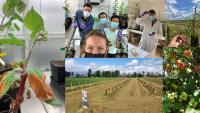
Ecological genomics of fruit tree-pest interaction
Species interactions are crucial for driving species adaptation and diversification. Interacting species evolve in a complex abiotic and biotic environment. However, the question of adaptation in species interactions, and of its genomic bases, has rarely been considered in an ecological context. My group (ECLECTIC for “ECoLogical gEnomiCs of muTi-species interaCtions”) studies abiotic, biotic and genomic drivers of species interactions, in particular of pest-fruit tree interactions, to understand how and why pests spread and adapt, and how their hosts fight back, in a context of climate change. We specifically study both sides of an interaction: the apple tree and its major aphid pest. We have carried out several experimental orchards in Europe of wild and cultivated apples to understand the impact of global changes on wild and crop fruit trees. Some of those are citizen science projects, involving associations, scientists and citizen around emblematic fruit trees to raise awareness on the impact of global changes on trees, and on the importance of conserving ex situ wild and crop fruit tree genetic diversity. Some of these orchards were also manually infested with aphids of various origins to unravel the impact of climate and the apple host on the aphid attack success. Those field experiments, along with sequenced genomes of both the apple and the aphid we recently obtained, will provide crucial insights into the ecological and genomic drivers of adaptation of fruit trees and their associated pests. Overall, we hope our research group will contribute to a better understanding of 1) how woody perennial species emerge, diversify and adapt in natural ecosystems and agrosystems, 2) how pests adapt to new hosts or global changes, and 3) how species interactions evolve in response to global changes. The answers to these issues are important for food production, health, and to improve our understanding of the fundamental processes generating and maintaining biodiversity in natural systems, particularly in a context of rapid global changes.
En viso: https://inrae-fr.zoom.us/j/96619861887?pwd=YUk5MmtuWG5pM3h2SG5IRDFUWllpZz09 Passcode: q23iwcNVaP